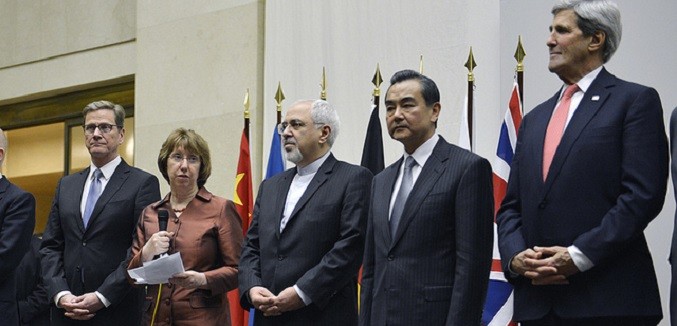The erosion of American influence in the Middle East has created power vacuums which are being filled by geopolitical rivals from across the region, forcing Washington’s allies to “take matters into their own hands,” according to analysis published Wednesday in the New York Times. Michael Doran and Max Boot – senior fellows at the Brookings Institution and the Council on Foreign Relations respectively – described Sunni-Shiite polarization in Lebanon, Syria, and Iraq as a function of the U.S. “refraining from countering Iranian machinations” in those countries. Fighting from Syria’s nearly three year old conflict has spilled over into the neighboring two countries, with Sunni elements – ranging from secularists to Salafists – aligning themselves against Iran and its proxies.
The situation will only get worse if Iran is allowed to maintain its nuclear program with international blessing. Saudi Arabia has made clear that it is prepared to build its own bomb, while Israel has threatened to launch a unilateral strike on Iranian nuclear facilities.
Mr. Obama’s hopes of using an opening to Iran to stabilize the Middle East will almost certainly backfire. Before long, America is likely to be forced back into its traditional, post-1979 role as the leader of a coalition to counter Iranian designs. The place to begin is in Syria, which is now ground zero in the struggle between the two regional blocs. Trying to draw the Iranians into a negotiated solution will almost certainly mean keeping Mr. Assad in power. That, in turn, will only play into the hands of Sunni extremists.
Lebanon in particular has been destabilized by Hezbollah’s participation in the Syrian conflict, which has in turn generated blowback in the form of jihadist retaliation on Lebanese soil. The Iran-backed terror group has also been central in preventing the formation of a Lebanese cabinet, leaving the country to be run by a weakened interim government. Meanwhile critics of the Obama administration’s approach to the region have also been growing more vocal in characterizing the White House’s approach – when it does orient itself robustly – as one of de facto alignment with Iran. Tony Badran, a research fellow at the Foundation for Defense of Democracies, last week blasted the administration for what he described as “increasingly obvious” partnership with Tehran and Hezbollah. Badran outlined a messaging campaign being conducted by the Iranians designed to “isolate Riyadh while playing up the emerging US alignment with Iran across the region,” and worried that the “proposition… seems to enjoy support in the US media and policy circles.”




